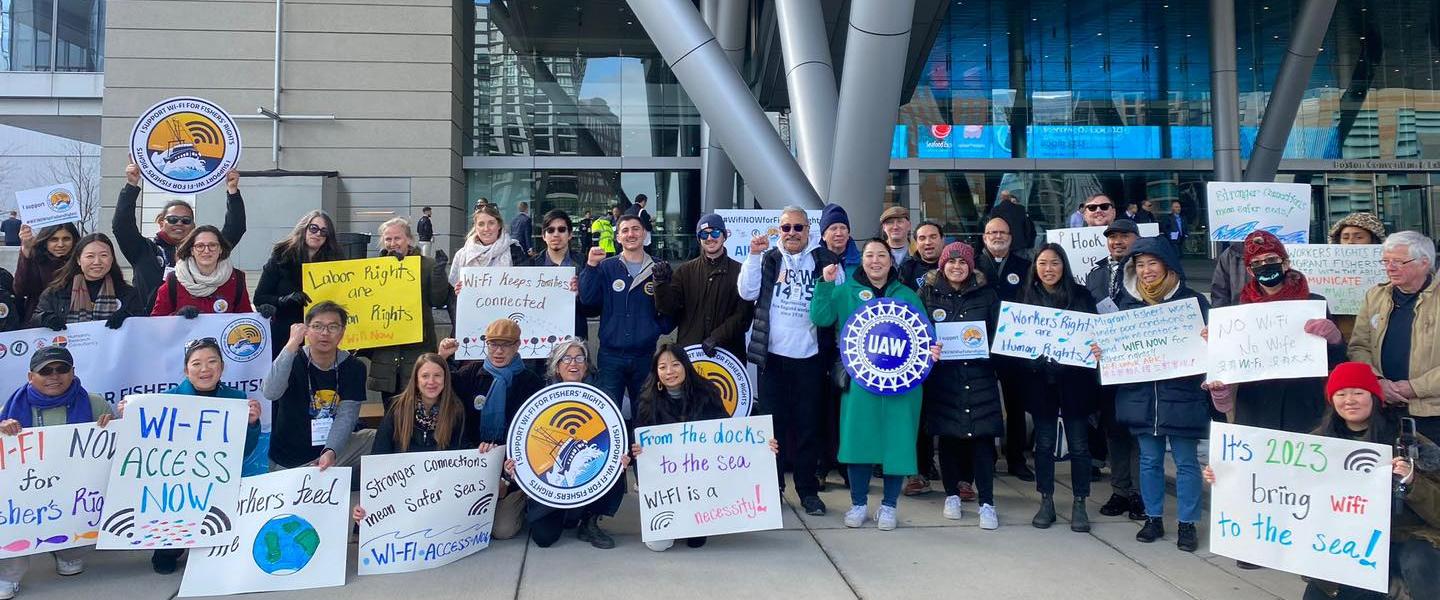On 12 March, campaigners from local labour unions, environmental groups, religious organisations, and other groups united with migrant fishers working on distant water fishing vessels to support an ongoing mission to secure guaranteed Wi-Fi on fishing boats travelling on the high seas for months, up to a year.
Global Labor Justice – International Labor Rights Forum (GLJ-ILRF), a non-governmental organisation that works transnationally to advance policies and laws that protect workers’ rights, organised the protest, a global solidarity campaign to call for Wi-Fi on every vessel in distant water fleets as a critical necessity to ensure workers’ rights under international labour standards.
Other groups involved in the campaign include the Indonesian Seafarers Gathering Forum, or Forum Silaturahmi Pelaut Indonesia (FOSPI), Stella Maris Kaohsiung, and Humanity Research Consultancy (HRC).
Some of the fishers spoke about the Wi-Fi Now for Fishers’ Rights at Sea campaign and why Wi-Fi and the ability to communicate are vital to protecting their human rights.
Edi Kasdiwan, a former worker on fishing vessels of Donggong, a southern port of Taiwan Island and member of the Indonesian Seafarers Gathering Forum (FOSPI), said that the work of migrant fishermen “crosses between life and death”.

He added, “Conditions are very tough on the high seas. We need Wi-Fi to communicate with our labour organisations and families. This is how we will protect our rights and our mental health and ensure we are getting fair pay and treatment.”
Supporters of the campaign called out the big seafood companies that make claims of a fair and safe supply chain but take little responsibility when it comes to providing fishers in their supply chains work under international labour standards.
“We are in Boston to hold the world’s biggest seafood companies responsible for their supply chains. Fishers are workers who deserve rights on the job. Migrant fishers have launched a global campaign for that right, and it’s time for these brands and retailers to come to the table with fishers and ensure that vessel owners respect their rights. These global buyers have the power to improve conditions and ensure communications access for workers in distant-water fleets,” said Kimberly Rogovin, Senior Seafood Campaign Coordinator, GLJ-ILRF.
Fishers can be at sea for up to a year, completely isolated from the outside world, unable to contact their families, friends, labour organisations, service providers, or state officials. The conditions onboard these vessels can be brutal.
Many workers have reported inadequate drinking water and food, sanitation problems, and a lack of onboard safety measures.
Migrant fishermen sometimes work under conditions labelled modern slavery. Despite working twenty or more hours a day, they sometimes do not receive pay, and many face egregious abuses such as forced labour, physical abuse, murders, and disappearances at sea.
Recently, the Yilan Migrant Fishers Union reported that fishers on a vessel called the Shunjie operating in the Tonga Islands without Wi-Fi equipment were forced to work 20 hours a day and had to wrap wounds from their work with wire tapes because there were no bandages and were reprimanded by the captain when they were unwell and pleaded for medical supplies.
After months under these atrocious conditions, the fishers finally docked, called upon their fellow fishers, and shared their Wi-Fi connection which enabled them to report their experience to labour unions.
The conditions facing migrant fishermen cast a long shadow on Asian fishing fleets' human rights record; speakers at the conference highlighted that the right of migrant fishermen to organise labour unions is artificial. Given that migrant fishermen are at sea for months at a time, they cannot contact their labour unions in the event of human rights abuses without Wi-Fi access.

David Hammond, Human Rights at Sea CEO, said: “HRAS is proud to support this vital campaign. Wi-Fi on vessels will make detecting human rights abuses markedly easier and hopefully have a preventative effect. It will be an important tool in ending human rights abuses at sea, but complex issues will remain around enforcement, access to justice, and remediation for victims. We remain dedicated to ensuring that human rights abuse at sea is prevented, detected, and remedied. The sea should not be a place where people can hide from justice.”
Contact: If you have any questions, please write to us at enquiries@humanrightsatsea.org
About Sharing. We welcome the use and dissemination of our work with proper accreditation. Please ensure that our Terms of Use are conformed with at all times.
Photo credit: Wi-Fi Now for Fishers' Rights at Sea
